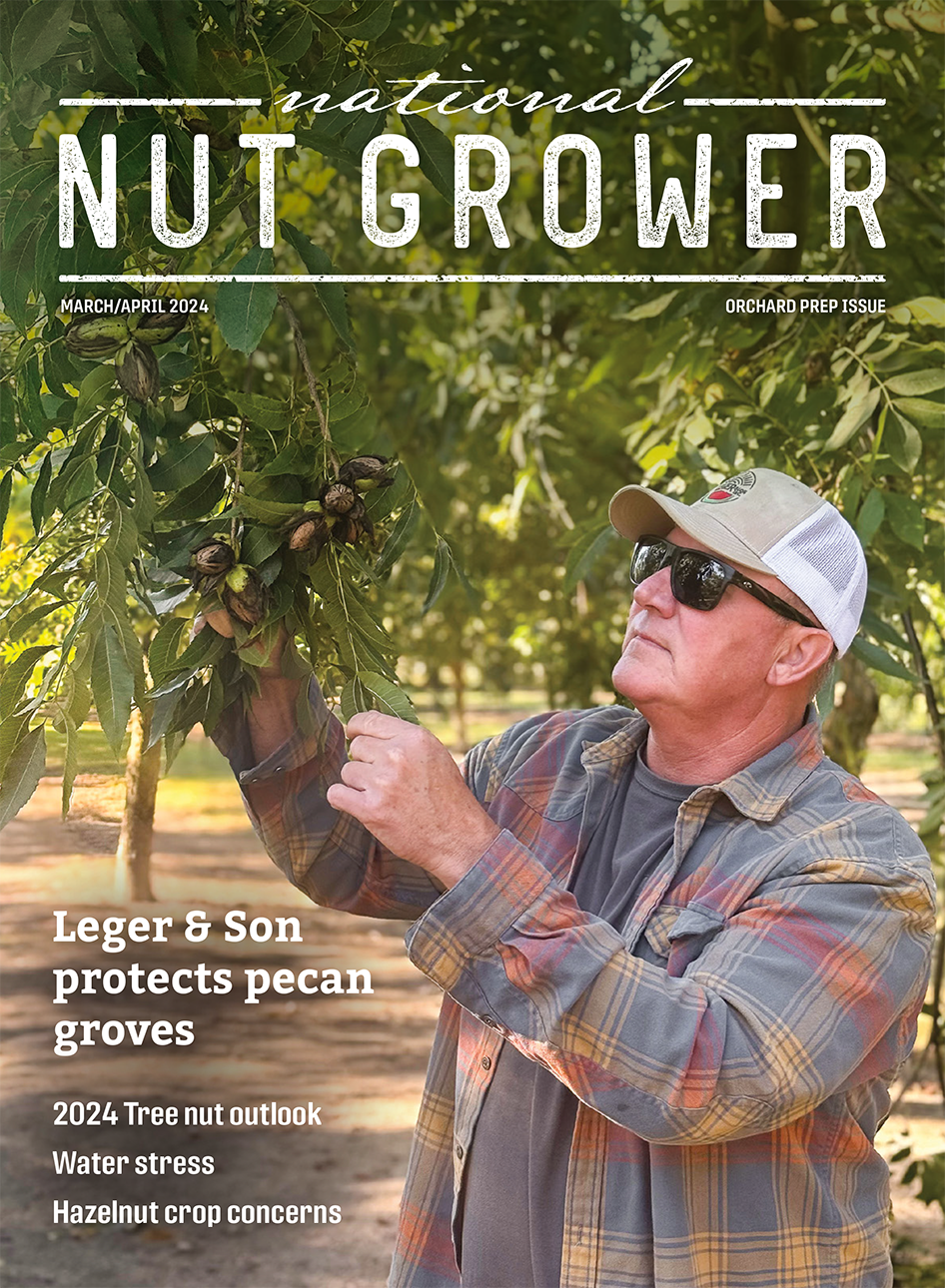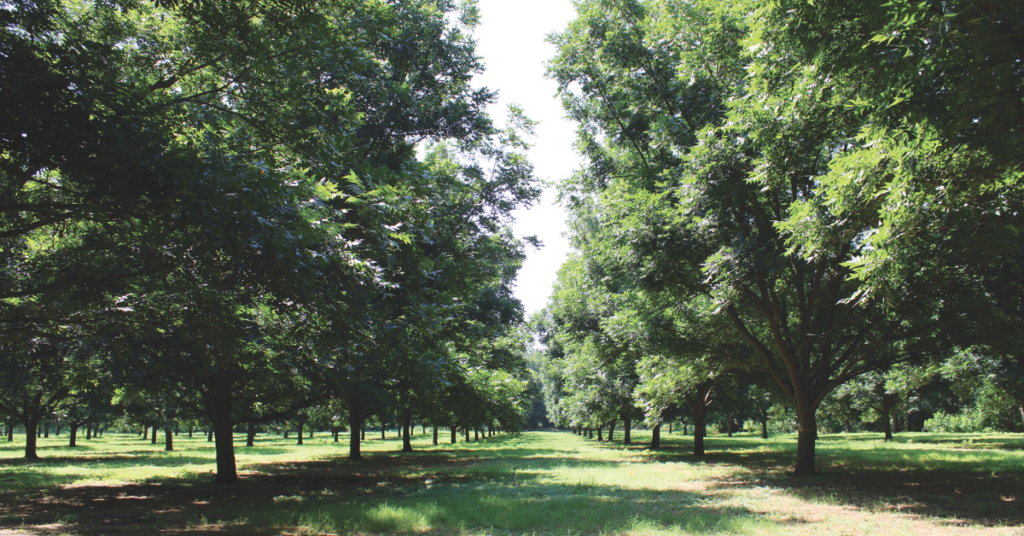
September/October 2023
Valuing THE SOIL
Regenerative agriculture practices and experiments involving soil improvements are key ingredients at Swift River Pecans, a Texas pecan grower.
Owner and first-generation grower Troy Swift began studying soil health and discovered new ways of thinking about managing soil and trees.
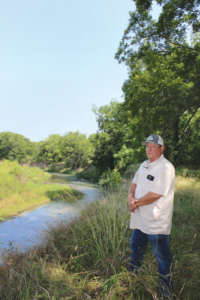
At his two central Texas orchards in Fentress and Staples, east of I-35 between Austin and San Antonio, native 300-year-old pecan trees tower over the river bottoms of the San Marcos River.
Central Texas is part of the area where native trees, which are generally smaller than improved varieties, evolved. Swift harvests from 1,000 native trees, 1,325 improved trees, 150 modern hybrids and 200 older hybrids on more than 260 acres. While he sells most of his pecans through a retail store and website, Swift also markets through a San Antonio farmers market and to area restaurants.
“Native trees across the native lands are the genetic reserves and genetic origin of the pecan industry,” Swift said. “It is critical we preserve these native forests for discoveries yet unmade. More importantly, the native riparian areas are critical for wildlife, flood mitigation and erosion control.”
Major pecan arthropod pests include the pecan nut case bearer, hickory shuck worm, stinkbugs, aphids and June bugs. Leading diseases are pecan scab and various leaf scorch problems.
REGENERATIVE CHANGE
The battle against pecan scab and leaf scorch is why Swift River changed to regenerative agriculture. Every conventional control method he was taught made the trees worse. Scientists and others who visited his orchard could only tell him there might be something wrong with his soil.
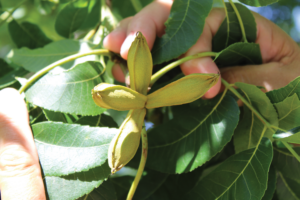
Swift River eliminated all herbicides. He is testing organic biologic foliar fungicides to stimulate systemic acquired resistance in trees, which offers long lasting protection against a broad spectrum of microorganisms. The fungicides should also be less harmful to the soil microbiome.
In the past, growers were taught that orchard floor plants robbed trees of water \ and fertilizers. Regenerative soil health teachings, however, recommend leaving orchard floors un-mowed, allowing roots to develop deeper in the soil and ultimately providing organic matter and water channels that make the soil more permeable. That improves water holding capacity, Swift said.
Instead of mowing every two weeks to keep grasses and weeds down, Swift said he only mows once before harvest except around sprinkler heads and other critical areas, saving hundreds of hours of labor and fuel, and reducing mower and tractor maintenance costs.
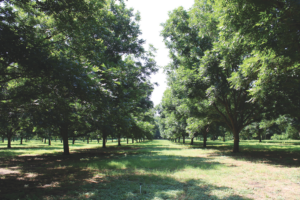
“Regenerative agriculture is the main cost-reducing and quality-improving effort,” he said. “Studying soil health has really opened my eyes to the opportunities to improve pecan marketability and reduce costs.”
Maintaining a biodiverse orchard floor with flowers and letting nature select the species, Swift River tries to keep the orchard floor covered with plants. Burr clover, wild oats and other grasses, brassicas, horse herb and other species grow naturally. To retain beneficial insects that lay eggs and parasitize pests, nectar must be available.
Weeds aren’t a problem. If they grow too high, which is rarely, Swift shreds them with a tractor-led wide rough mower, the type used to mow along roads. He wants to protect the soil from the wind and central Texas’ overbearing summer heat.
Swift River’s farm and sawmill business generate little waste. It composts organic waste including wood shavings, bark, sawdust and pecan harvest waste. All pecan shells from Swift’s shelling facility are used in compost or mulch.
BAT PATROL
For pest control, Swift River recently partnered with a bat conservation group. Swift said he hopes the bats will hold pest populations below the “economic threshold” to avoid crop damage and eliminate the need for insecticides. The business constructed 16 bat houses at the sawmill, and installed them on the property.
“Insectivores should be considered much more in farming,” Swift said. “We consider birds to be the day shift and bats to be the night shift.” Troy Swift, Swift River Pecans

Studies show bats eat some pecan pests, but Swift wants to understand what they are eating in his groves. He hopes bats consume pecan nut casebearer moth, hickory schuck worm moth, fall web worm moth, spittlebugs, stinkbugs and June bugs.
“Insectivores should be considered much more in farming,” Swift said. “We consider birds to be the day shift and bats to be the night shift.”
Swift River is working with Texas A&M and a nursery on a biochar experiment, a product made by burning organic matter in an oxygen-deprived environment. Biochar can store carbon for hundreds of years and improve soil quality.
The trial involves planting 110 young bare root pecan trees with four different biochar treatments. Two of the treatments included Johnson-Su compost mixed with the biochar. Growth measurements gauge plant response.
Swift also uses wood chips, compost and bioreactor liquid extract on orchard floors. The bioreactor produces an easily dissolvable diverse fungal dominant microbial compost. The compost should increase soil organic matter and promote soil health, Swift said.
Swift River also sprays two types of liquid humates and liquid zinc on the ground. It is also experimenting with biological sprays to control scab.
Swift hasn’t experienced much difficulty sourcing agricultural chemicals, but prices remain prohibitive.
“Soil health is a logical countermeasure to agricultural chemical price and availability problems,” he said. “Soil health, high organic matter, and cover crops are also a very important countermeasure to drought.”
NEW GROWER STRUGGLES
Swift, who farms with his wife Athanasee, bought his first farm in 1988 and planted his first orchard of improved trees in 2001.
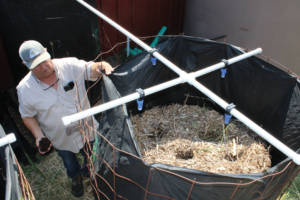
Raised in an oilfield family that moved around Texas, Louisiana, Oklahoma and Canada, Swift graduated from Southwest Texas State University in San Marcos with a bachelor’s degree in Industrial Arts in 1982. He worked in the canoe/kayak industry and for a company that built composite jet engine parts for General Electric.
“The biggest struggle was being a first-generation pecan farmer,” he said. “There was no farming process or equipment in place when I started.”
He became active in the Texas Pecan Growers Association to learn about the industry, and find instruction and equipment suppliers. He also attended a Texas A&M pecan short course to learn farming techniques.
Being a successful grower requires spending time in the orchard. “Absentee farming is far less effective and less satisfying,” Swift said. “Daily observation of orchard conditions will serve the grower the best. Education and keeping up to date with new technology and testing methods is also important. Studying soil science and plant science is also very helpful.”
In addition to the lumber mill, Swift runs pecan processing equipment and produces pecan oil.







